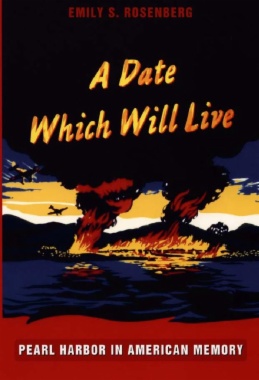December 7, 1941—the date of Japan’s surprise attack on the U.S. fleet at Pearl Harbor—is "a date which will live" in American history and memory, but the stories that will live and the meanings attributed to them are hardly settled. In movies, books, and magazines, at memorial sites and public ceremonies, and on television and the internet, Pearl Harbor lives in a thousand guises and symbolizes dozens of different historical lessons. In A Date Which Will Live, historian Emily S. Rosenberg examines the contested meanings of Pearl Harbor in American culture.
Rosenberg considers the emergence of Pearl Harbor’s symbolic role within multiple contexts: as a day of infamy that highlighted the need for future U.S. military preparedness, as an attack that opened a "back door" to U.S. involvement in World War II, as an event of national commemoration, and as a central metaphor in American-Japanese relations. She explores the cultural background that contributed to Pearl Harbor’s resurgence in American memory after the fiftieth anniversary of the attack in 1991. In doing so, she discusses the recent “memory boom” in American culture; the movement to exonerate the military commanders at Pearl Harbor, Admiral Husband Kimmel and General Walter Short; the political mobilization of various groups during the culture and history "wars" of the 1990s, and the spectacle surrounding the movie Pearl Harbor. Rosenberg concludes with a look at the uses of Pearl Harbor as a historical frame for understanding the events of September 11, 2001.
- Contents
- Acknowledgments
- Introduction
- I Signifying Pearl Harbor: The First Fifty Years
- 1. Infamy: Reinvigorating American Unity and Power
- 2. Backdoor Deceit: Contesting the New Deal
- 3. Representations of Race and Japanese-AmericanRelations
- 4. Commemoration of Sacrifice
- II Reviving Pearl Harbor after 1991
- 5. Bilateral Relations: Pearl Harbor’s Half-Century Anniversary and the Apology Controversies
- 6. The Memory Boom and the ‘‘Greatest Generation’’
- 7. The Kimmel Crusade, the History Wars, and the Republican Revival
- 8. Japanese Americans: Identity and Memory Culture
- 9. Spectacular History
- 10. Day of Infamy: September 11, 2001
- Notes
- Bibliography
- Index

